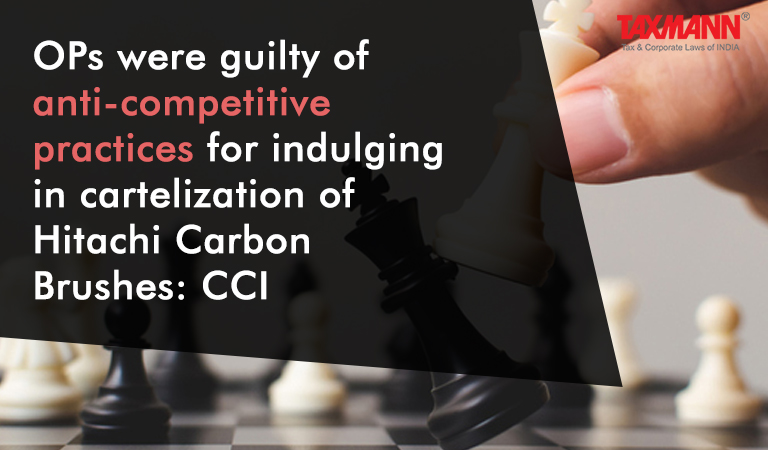OPs were guilty of anti-competitive practices for indulging in cartelization of Hitachi Carbon Brushes: CCI
- Blog|News|Competition Law|
- 3 Min Read
- By Taxmann
- |
- Last Updated on 25 January, 2022

Case Details: Rizwanul Haq Khan v. Mersen (India) (P.) Ltd. - [2022] 134 taxmann.com 88 (CCI)
Judiciary and Counsel Details
-
- Ashok Kumar Gupta, Chairperson
- Ms. Sangeeta Verma and Bhagwant Singh Bishnoi, Member
- S. Natrajan, Dy. Chief Materials Manager Vasanth Rajasekaran, Saurabh Babulkar, Ms. Kripi Kathuria, Ms. Ritika Ganju, Advs. Rajeev Sharma, Sr. Adv. Rishad A. Chowdhury, Ms. Priyanka Devgan and Rajat Krishna, Advs. for the Appearing Parties
Facts of the Case
In the instant case Mr. Rizwanul Haq Khan, Deputy Chief Materials Manager/Controller of Stores, Southern Railway (Hereinafter referred as ‘Informant’) filed a complaint under Section 19 (1) (b) of the Act against Mersen (India) Private Limited (Hereinafter referred as ‘OP-1’), and Assam Carbon Products Limited (Hereinafter referred as ‘OP-2’ )[collectively, ‘OPs’] alleging inter alia contravention of the provisions of Section 3 & 4 of the Act.
OP-1 was a leading company with expertise in manufacturing brushes and brush holders for industrial electric motors. OP-2 was an MSME and was inter alia engaged in the supply of carbon brushes for Hitachi Traction Motor, to Indian Railways.
Southern Railway had been procuring Carbon Brushes for Hitachi Traction Motor from the OPs. The OPs were stated to be the only two Research Designs and Standards Organisation (RDSO) approved vendors of the said product in India and the Informant had no other option but to procure the said product from them.
The informant alleged that the OPs had been steadily hiking the rates of carbon brushes for the last 5 years in tandem with each other without any justification. To support the allegations, the Informant had enclosed a table containing the rates quoted by OPs from 2010 to 2015. It had been thus alleged that various tenders, floated by the Informant for procurement of carbon brushes had been rigged by the OPs by way of cartelization and collusive bidding.
CCI Held
The Commission found that e-mails/WhatsApp chats exchanged between OPs, it was also found that OPs discussed amongst themselves prospective bid prices to enable either sharing of tenders between them based on split provisions or rotation of bids. They had even discussed how they would compensate if they did not win previous or earlier tenders.
MD of OP-1, in his deposition before the DG, admitted that his company discussed with its competitor, i.e., OP-2, and decided the prices to be quoted in certain tenders floated by the Railways so that both companies can share the quantity. Further, he also admitted that, broadly, there was an informal agreement on prices to be quoted with OP-2.
Given the above, taking into account all the aforesaid evidence collected by the DG, it was concluded that OPs had indulged in cartelization in the Hitachi Carbon Brushes market in India, through coordinating bid response and manipulating the bidding process, which had an AAEC within India. The exchange of communication was direct evidence displaying the anti-competitive conduct of the OPs and sufficient to hold that OPs have contravened the provisions of section 3(3)(d).
Further, the parties have failed to show as to how their impugned conduct resulted in any accrual of benefits to consumers; improvements in production or distribution of goods or provision of services; or promotion of technical, scientific, and economic development through production or distribution of goods or provision of services, in terms of section 19(3).
In view of the above OPs have contravened the provisions of section 3(1) read with section 3(3)(d) and thus, OP-1 and OP-2 and their respective officials who have been held liable in terms of the provisions of Section 48 were directed to cease and desist in the future from indulging in practices which have been found in the present order to be in contravention of the provisions of the Act.
List of Cases Referred to
-
- Excel Crop Care Ltd. v. CCI [2017] 81 taxmann.com 173/141 SCL 480 (SC) (para 32)
- Cadila Healthcare Ltd. v. CCI [2018] 97 taxmann.com 237/149 SCL 610 (Delhi)
- CCI v. Steel Authority of India Ltd. [2010] 7 taxmann.com 23/103 SCL 269 (SC)
Disclaimer: The content/information published on the website is only for general information of the user and shall not be construed as legal advice. While the Taxmann has exercised reasonable efforts to ensure the veracity of information/content published, Taxmann shall be under no liability in any manner whatsoever for incorrect information, if any.

Taxmann Publications has a dedicated in-house Research & Editorial Team. This team consists of a team of Chartered Accountants, Company Secretaries, and Lawyers. This team works under the guidance and supervision of editor-in-chief Mr Rakesh Bhargava.
The Research and Editorial Team is responsible for developing reliable and accurate content for the readers. The team follows the six-sigma approach to achieve the benchmark of zero error in its publications and research platforms. The team ensures that the following publication guidelines are thoroughly followed while developing the content:
- The statutory material is obtained only from the authorized and reliable sources
- All the latest developments in the judicial and legislative fields are covered
- Prepare the analytical write-ups on current, controversial, and important issues to help the readers to understand the concept and its implications
- Every content published by Taxmann is complete, accurate and lucid
- All evidence-based statements are supported with proper reference to Section, Circular No., Notification No. or citations
- The golden rules of grammar, style and consistency are thoroughly followed
- Font and size that’s easy to read and remain consistent across all imprint and digital publications are applied



 CA | CS | CMA
CA | CS | CMA
